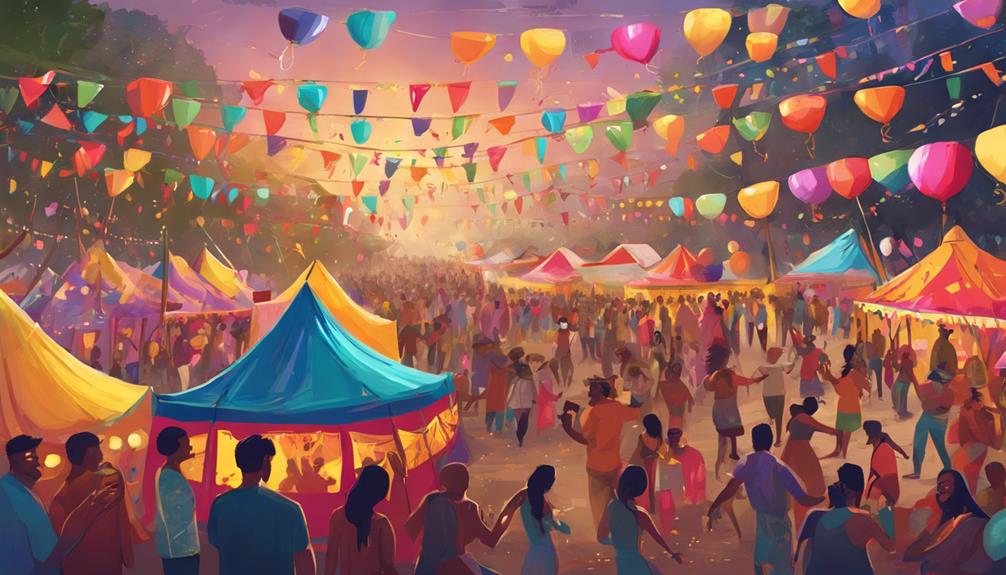You're likely familiar with the term 'festival,' but you might not know that it encompasses a vast array of celebrations and events that bring people together, preserve cultural heritage, and drive social and economic impact. A festival is fundamentally a celebration that showcases community traditions, customs, and history, often featuring music, art, food, and drink. There are various types of festivals, including cultural heritage, music and arts, food and drink, and thematic festivals, each with its unique characteristics and significance. As you explore the world of festivals, you'll discover the rich diversity and complexity that defines these vibrant events.
Key Takeaways
- The word 'festival' originates from the 14th century, derived from Old French 'festival' and Latin 'festivus.'
- Festivals relate to feasting and celebrations, influenced by cultural and social factors, evolving to encompass diverse events.
- Festivals can be categorized into various types, including cultural heritage, music and arts, food and drink, and thematic festivals.
- The term 'festival' encompasses a broad range of celebrations, from traditional practices to modern events with diverse themes and experiences.
Origins of the Word Festival
You're likely familiar with the word 'festival,' but have you ever wondered where it comes from?
The term 'festival' has a rich history, with etymological roots dating back to the 14th century. It originated from the Old French word 'festival,' which is derived from the Latin 'festivus,' meaning 'of or pertaining to a feast.'
Over time, the word underwent linguistic evolution, influenced by various cultural and social factors. As languages and traditions intersected, the concept of a festival expanded to encompass a wide range of celebrations and events.
Key Elements of a Festival
As we move beyond the etymological roots of the word 'festival,' it's clear that a festival typically comprises several key elements that come together to create a unique and memorable experience for participants and attendees alike.
You'll notice that festival planning is an essential aspect, involving careful consideration of logistics, budgeting, and scheduling. Effective festival planning guarantees a smooth execution, allowing attendees to focus on enjoying the event.
Community engagement is another critical element, as festivals often rely on local support and participation to thrive. This can involve collaborations with local businesses, artists, and organizations to create a diverse and inclusive atmosphere.
Types of Festivals Around World
As you explore the diverse world of festivals, you'll notice that they can be broadly categorized into several types.
You'll find festivals that celebrate cultural heritage, showcasing traditional practices and customs that have been passed down through generations.
Additionally, you'll come across festivals that focus on music and arts, as well as those that highlight local cuisine and drinks, each offering a unique experience that reflects the host community's identity.
Cultural Heritage Festivals
Cultural heritage festivals, which celebrate a community's traditions, customs, and history, can be found in almost every corner of the world, offering a unique glimpse into the diverse ways people preserve and honor their cultural identities.
You'll notice that these festivals often showcase traditional practices, such as folk dances, music, and handicrafts, which are passed down from generation to generation.
Community engagement is a key aspect of these festivals, as locals come together to share their customs and traditions with visitors.
By participating in cultural heritage festivals, you'll gain a deeper understanding of the community's values, beliefs, and history.
You might even have the opportunity to take part in workshops or demonstrations, allowing you to experience the traditional practices firsthand.
This hands-on approach fosters a sense of connection and appreciation for the community's cultural heritage.
Music and Arts
You'll find that music and arts festivals, which celebrate creative expression and showcase local talent, are a staple of the festival scene worldwide. They offer a diverse range of performances, exhibitions, and interactive experiences that cater to various tastes and interests.
These festivals provide a platform for artists to express themselves through various musical genres, such as jazz, rock, and classical, as well as artistic expression through mediums like painting, sculpture, and photography.
Some notable examples of music and arts festivals include:
- Coachella, a music festival in California featuring top artists and bands
- Burning Man, a week-long festival in Nevada celebrating art, music, and self-expression
- Venice Biennale, a prestigious art festival in Italy showcasing contemporary art from around the world
Food and Drink
Festivals centered around food and drink have become increasingly popular worldwide, offering a unique opportunity for people to sample local specialties, learn about traditional cooking methods, and indulge in exotic flavors from around the globe.
You'll find festivals celebrating specific ingredients, like tomatoes or chocolate, as well as those highlighting regional culinary traditions.
Beverage pairings are also a key aspect of many food festivals, with wine, beer, and spirits expertly matched with dishes to enhance their flavors.
Whether you're a foodie or just looking to try something new, these festivals provide a chance to explore the diverse world of cuisine.
From street food to haute cuisine, food and drink festivals offer a delicious way to experience different cultures and traditions.
Cultural Significance of Festivals
A festival's cultural significance can be seen in its ability to bring people together, create a sense of community, and provide a platform for artistic expression, all of which are essential to a society's well-being.
As you participate in a festival, you become part of a larger collective, connected by shared experiences and emotions. This sense of community engagement fosters social bonds and strengthens relationships.
Festivals also provide opportunities for spiritual connections, allowing you to reflect on your values and beliefs.
Some key aspects of a festival's cultural significance include:
- Preserving traditional practices and customs
- Showcasing local art, music, and literature
- Providing a platform for social commentary and activism
History of Festival Celebrations
As you've seen how festivals contribute to a society's cultural fabric, it's interesting to explore how these celebrations have evolved over time, with many modern festivals having roots in ancient traditions and customs.
Ancient rituals, often tied to seasonal celebrations, were a key part of early festivals. For example, ancient cultures would hold harvest festivals to give thanks for a bountiful crop, while others would celebrate the changing of the seasons with rituals to guarantee fertility and prosperity.
These early festivals were often deeply spiritual, with participants believing that their rituals could influence the gods and guarantee a good harvest or a safe passage through the changing seasons.
Evolution of Modern Festivals
While ancient festivals laid the groundwork for modern celebrations, you'll notice that contemporary festivals have undergone significant transformations, influenced by changing societal values, technological advancements, and globalization.
As a result, festival trends have shifted towards more inclusive, diverse, and sustainable events. You'll observe that modern festivals prioritize environmental sustainability, incorporating eco-friendly practices and reducing waste.
Here are some key aspects of the evolution of modern festivals:
- Increased focus on festival sustainability, with many events adopting green initiatives and reducing carbon footprints.
- Growing diversity in festival lineups, featuring artists and performers from diverse backgrounds and genres.
- Integration of technology, such as mobile apps and social media, to enhance the festival experience.
Characteristics of a Successful Festival
To create a festival that resonates with attendees and leaves a lasting impact, organizers must carefully consider several key characteristics that set successful events apart from the rest.
When planning a festival, you'll want to focus on building community engagement, which involves encouraging participation from local residents and incorporating their feedback into the event's programming. This not only helps create a sense of ownership among attendees but also guarantees that the festival reflects the unique character of the host community.
Additionally, prioritizing festival sustainability is essential, as it minimizes the event's environmental footprint and promotes eco-friendly practices.
By incorporating these characteristics, you can create a successful festival that not only delights attendees but also benefits the surrounding community and the environment.
Effective planning is key to achieving this delicate balance.
Impact of Festivals on Society
With effective planning in place to guarantee a successful festival, organizers and attendees alike often begin to reflect on the broader consequences of such events on society – an intriguing inquiry that leads to examining how festivals actually influence their surroundings, locally and beyond.
As you explore the impact of festivals on society, you'll notice that they've a profound effect on community bonding and economic growth.
Here are some key aspects to contemplate:
Festivals foster community bonding by bringing people together, promoting social cohesion, and creating a sense of belonging.
They also have a significant economic impact, generating revenue for local businesses and creating jobs.
Additionally, festivals can showcase local culture, preserving traditional practices and promoting cultural exchange.
Moreover, they can also contribute to urban development, revitalizing public spaces and enhancing the overall quality of life.
Conclusion
As you've learned, festivals are vibrant events that bring people together to celebrate life's many joys.
You've explored the origins of the word 'festival', the key elements that make up a festival, and the diverse types of festivals around the world.
With a deep understanding of their cultural significance and history, it's clear that festivals have a profound impact on society.
Now, as you move forward, consider the characteristics of successful festivals and how they continue to evolve.



